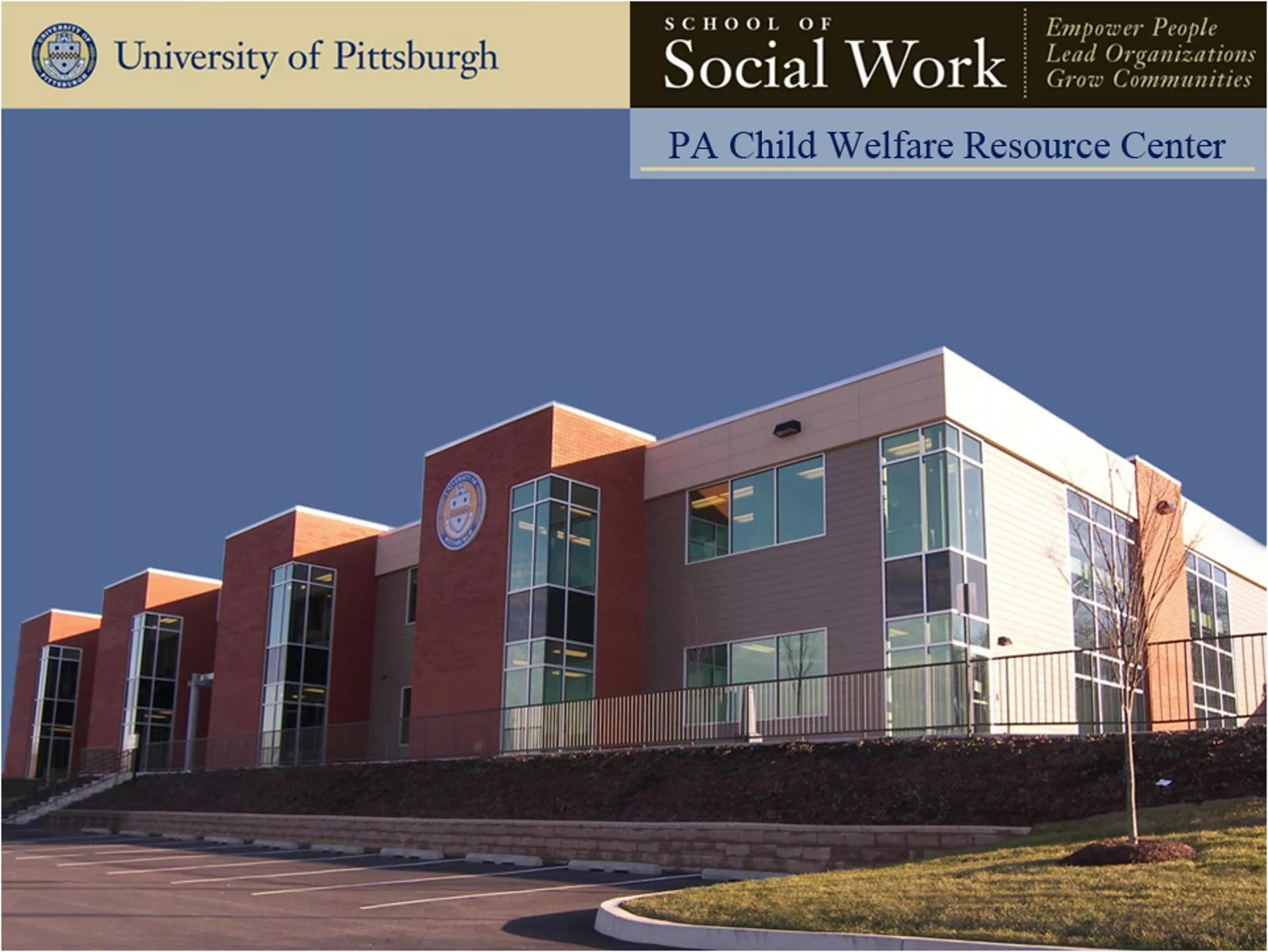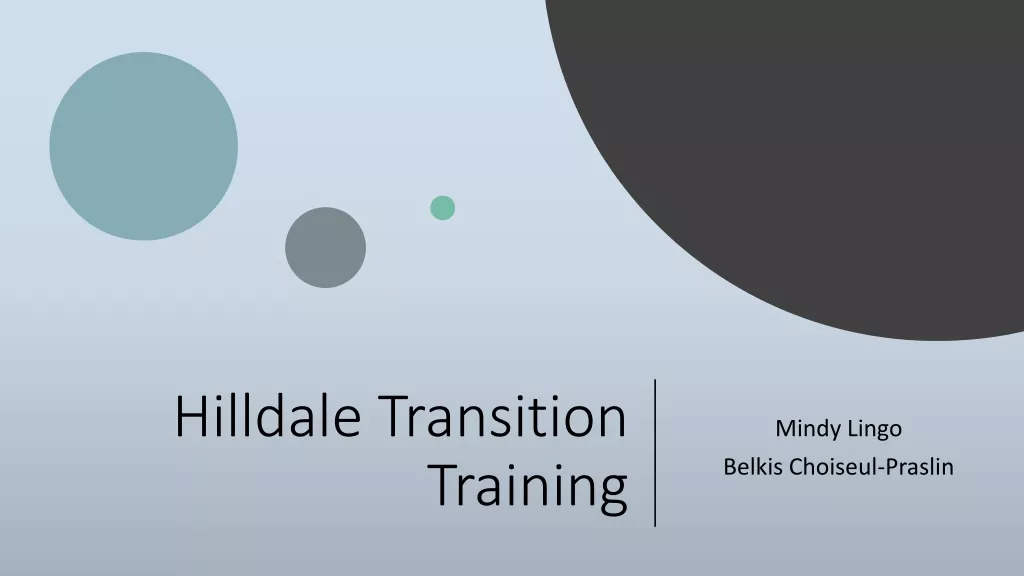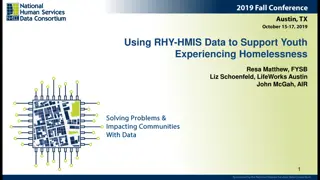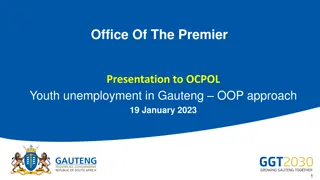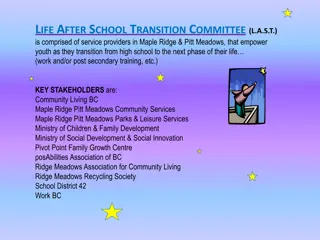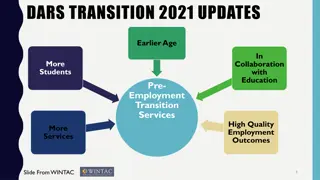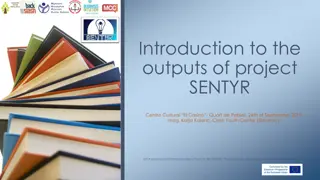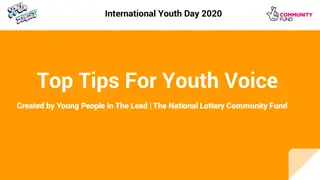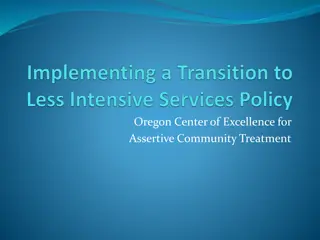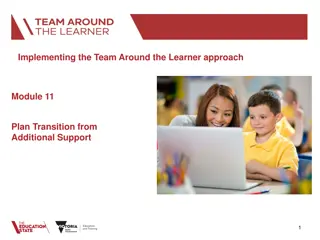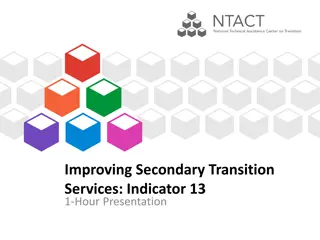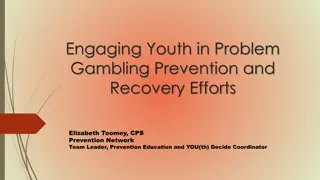Tips and Tools for Youth in Transition Planning
Explore the importance of transition planning for youth aging out of the system, incorporating Pennsylvania court rules and strategies to engage older youth effectively. Learn about Pre-Transition Planning Tools, Trial Discharge Rules, and Monitoring Transition Plans to improve outcomes and avoid issues like incarceration, homelessness, and reliance on public assistance.
Uploaded on Oct 08, 2024 | 0 Views
Download Presentation

Please find below an Image/Link to download the presentation.
The content on the website is provided AS IS for your information and personal use only. It may not be sold, licensed, or shared on other websites without obtaining consent from the author.If you encounter any issues during the download, it is possible that the publisher has removed the file from their server.
You are allowed to download the files provided on this website for personal or commercial use, subject to the condition that they are used lawfully. All files are the property of their respective owners.
The content on the website is provided AS IS for your information and personal use only. It may not be sold, licensed, or shared on other websites without obtaining consent from the author.
E N D
Presentation Transcript
Planning With Youth in Transition Tips, Tools and Techniques
Agenda Introductions, Objectives, What s In It For Me? Juvenile Court Rules Rule 1608 Pre-Transition Planning Tools Tips for Engaging Youth in Transition Planning Juvenile Court Rules Rule 1631 Trial Discharge Improving Outcomes Using Court Rules Activity Review, Questions, and Answers Monitoring the Transition Plan The Pennsylvania Child Welfare Resource Center 202: Planning with Youth in Transition: Tips, Tools, and Techniques 2
Learning Objectives 1. Examine PA court rules on transition planning; 2. Examine transition assessment and planning tools; 3. Demonstrate the use of rules to advocate for older youth; and 4. Explain the process of engaging older youth in planning The Pennsylvania Child Welfare Resource Center 202: Planning with Youth in Transition: Tips, Tools, and Techniques 3
Transition Planning: Why is it Important? % of older youth in system is growing Poor outcomes for youth who age out without permanency: Incarceration Reliance on public assistance Homelessness Required by federal law (Fostering Connections) The Pennsylvania Child Welfare Resource Center 202: Planning with Youth in Transition: Tips, Tools, and Techniques 4
Pennsylvania Juvenile Court Procedural Rules Rule 1608 (Permanency Hearing) Rule 1631 (Termination of Court Supervision) The Pennsylvania Child Welfare Resource Center 202: Planning with Youth in Transition: Tips, Tools, and Techniques 5
Rule 1608: Permanency Hearing Findings at all six-month hearings. At each permanency hearing, the court shall enter its findings and conclusions of law into the record and enter an order, on the record in open court, the court shall state: Effective January 1, 2016 the services needed to assist a child who is fourteen years of age or older to make the transition to a successful adulthood, including: The Pennsylvania Child Welfare Resource Center 202: Planning with Youth in Transition: Tips, Tools, and Techniques 6
Transition to Successful Adulthood Specific independent living services or instructions that are currently being provided; Areas of need in independent living instruction that have been identified by the independent living assessment; Independent living services that the child will receive prior to the next permanency review hearing; Whether the child is in the least restrictive, most family-like setting that will enable him to develop independent living skills; Efforts that have been made to develop and maintain connections with supportive adults regardless of placement type; The Pennsylvania Child Welfare Resource Center 202: Planning with Youth in Transition: Tips, Tools, and Techniques 7
Transition to Successful Adulthood Whether the child is making adequate educational progress to graduate from high school or whether the child is enrolled in another specified educational program that will assist the child in achieving self-sufficiency; Job-readiness services that have been provided to the child and the employment/career goals that have been established; Whether the child has physical health or behavioral health needs that will require continued services into adulthood; And Steps being taken to ensure that the youth will have stable housing or living arrangements when discharged from care The Pennsylvania Child Welfare Resource Center 202: Planning with Youth in Transition: Tips, Tools, and Techniques 8
Pre-Transition Tools Use of Assessment and Planning Tools CWRC transition assessment, screen, plan Fostering Connections Transitions Toolkit Pike County Transition Binders Child Preparation Services Transition planning focused meetings Family Group Decision Making Team Meetings The Pennsylvania Child Welfare Resource Center 202: Planning with Youth in Transition: Tips, Tools, and Techniques 9
Tips for Engaging Youth The Pennsylvania Child Welfare Resource Center 202: Planning with Youth in Transition: Tips, Tools, and Techniques 10
Rule 1631: Termination of Court Supervision Children eighteen years of age or older: Before the court can terminate its supervision of a child 18 years of age or older a hearing shall be held at least 90 days prior to the child turning 18 years of age The child shall have the opportunity to make decisions about the transition plan and confer with agency about the details of the plan The county agency shall provide the transition plan to the court The Pennsylvania Child Welfare Resource Center 202: Planning with Youth in Transition: Tips, Tools, and Techniques 11
Requirements of Transition Plan: Specific plans for housing Description of the child s source of income Specific plans for pursuing educational or vocational training goals Child s employment goals and whether the child is employed A description of the health insurance plan that the child is expected to obtain and any continued health or behavioral health needs of the child A description of any available programs that would provide mentors or assistance in establishing positive adult connections Verification that all vital identification documents and records have been provided to the child A description of any other needed support services Notice to the child that the child can request resumption of juvenile court jurisdiction until the child turns twenty-one years of age if specific conditions are met. The Pennsylvania Child Welfare Resource Center 202: Planning with Youth in Transition: Tips, Tools, and Techniques 12
Termination of Court Supervision Court cannot terminate supervision without approving appropriate transition plan UNLESS child, after appropriate plan is offered, is unwilling to consent to supervision and court determines termination of court supervision is warranted The Pennsylvania Child Welfare Resource Center 202: Planning with Youth in Transition: Tips, Tools, and Techniques 13
The Fostering Connections to Success and Increasing Adoptions Act of 2008 Federal law enacted to: Connect and support relative caregivers Improve outcomes for children in foster care Pennsylvania enacted Act 91 and Act 80 to: Implement Fostering Connections Provide greater opportunities and support to older youth in foster care The Pennsylvania Child Welfare Resource Center 202: Planning with Youth in Transition: Tips, Tools, and Techniques 14
Act 91 of 2012 Effective July 5, 2012 Expanded criteria for youth to stay in out-of-home care beyond age 18 until age 21 by amending the definition of Child in the Juvenile Act to include an individual who: Is under the age of 21 years and was adjudicated dependent before reaching the age of 18 years, who has requested the court to retain jurisdiction and who remains under the jurisdiction of the court as a dependent child because the court has determined that the child is: (i) completing secondary education or an equivalent credential; (ii) enrolled in an institution which provides postsecondary or vocational education; (iii) participating in a program actively designed to promote or remove barriers to employment; (iv) employed for at least 80 hours per month; or (v) incapable of doing any of the activities described in subparagraph (i), (ii), (iii) or (iv) due to a medical or behavioral health condition, which is supported by regularly updated information in the permanency plan of the child. The Pennsylvania Child Welfare Resource Center 202: Planning with Youth in Transition: Tips, Tools, and Techniques 15
Act 91 of 2012 Effective July 5, 2012 Allowed for resumption of jurisdiction for youth to return to out-of-home care beyond age 18 until age 21 by amending the definition of Child in the Juvenile Act The Pennsylvania Child Welfare Resource Center 202: Planning with Youth in Transition: Tips, Tools, and Techniques 16
Act 91 of 2012 Criteria The Individual: Is under the age of 21 years and was adjudicated dependent before reaching the age of 18 years, has requested the court to retain jurisdiction, and has remained under the jurisdiction of the court as a dependent child. Termination of dependency court jurisdiction must have occurred within 90 days of the youth turning 18, or after age 18. The Pennsylvania Child Welfare Resource Center 202: Planning with Youth in Transition: Tips, Tools, and Techniques 17
Act 91 of 2012 Criteria (continued) Court has determined that the child is: (i) completing secondary education or an equivalent credential; (ii) enrolled in an institution which provides postsecondary or vocational education; (iii) participating in a program actively designed to promote or remove barriers to employment; (iv) employed for at least 80 hours per month; or (v) incapable of doing any of the activities described in subparagraph (i), (ii), (iii) or (iv) due to a medical or behavioral health condition, which is supported by regularly updated information in the permanency plan of the child. The Pennsylvania Child Welfare Resource Center 202: Planning with Youth in Transition: Tips, Tools, and Techniques 18
Act 80 of 2012 Effective July 1, 2012 Extended adoption subsidies for eligible youth Under the age of 21 years Attained 13 years of age before adoption assistance agreement was finalized Met certain conditions Extended guardianship subsidies for eligible youth Amended and added several definitions The Pennsylvania Child Welfare Resource Center 202: Planning with Youth in Transition: Tips, Tools, and Techniques 19
Act 80 of 2012 Definitions Definition of child in Public Welfare Code includes an individual who: is under the age of twenty-one years and who attained thirteen years of age before the adoption assistance agreement became effective and who is: (i) completing secondary education or an equivalent credential; (ii) enrolled in an institution which provides postsecondary or vocational education; (iii) participating in a program actively designed to promote or remove barriers to employment; (iv) employed for at least eighty hours per month; or The Pennsylvania Child Welfare Resource Center 202: Planning with Youth in Transition: Tips, Tools, and Techniques 20
Act 80 of 2012 Definitions (continued) (v) incapable of doing any of the activities described in subclause (i), (ii), (iii) or (iv) due to a medical or behavioral health condition, which is supported by regularly updated information in the permanency plan of the child. Eligible Child Eligible permanent legal custodian Kin Permanent Legal custodian Subsidized permanent legal custodianship Subsidized permanent legal custodianship agreement The Pennsylvania Child Welfare Resource Center Relative Notification 202: Planning with Youth in Transition: Tips, Tools, and Techniques 21
Improving Outcomes Using Court Rules Court oversight of youth s plan, agency s support Opportunity to engage youth Continued court jurisdiction if transition plan is absent or weak Implements Fostering Connections legislation The Pennsylvania Child Welfare Resource Center 202: Planning with Youth in Transition: Tips, Tools, and Techniques 22
Activity What does Sienna need? What is her transition plan, as presented, missing? What would you advocate for Sienna? How should court order be written to ensure she receives what she needs? The Pennsylvania Child Welfare Resource Center 202: Planning with Youth in Transition: Tips, Tools, and Techniques 23
Tools/Suggestions for Preparing Youth for Court Institute hearing requiring youth participation Cumberland County Northumberland County Adams County Prepare tools that help youth participate Youth Fostering Change Youth-Developed Discharge Hearing Form The Pennsylvania Child Welfare Resource Center 202: Planning with Youth in Transition: Tips, Tools, and Techniques 24
The Transition Plan in the Real World The Pennsylvania Child Welfare Resource Center 202: Planning with Youth in Transition: Tips, Tools, and Techniques 25
Monitoring the Transition Plan What are some good techniques to assist in monitoring a transition plan? How do alumni want to be supported and how can we help? What are some strategies to try if the transition plan isn t working as planned? The Pennsylvania Child Welfare Resource Center 202: Planning with Youth in Transition: Tips, Tools, and Techniques 26
Tips for Successful Transition Plans Begin early Engage youth, supportive adults Maintain high expectations but be realistic about steps to achieve goals Be concrete, specific Create back-up plans The Pennsylvania Child Welfare Resource Center 202: Planning with Youth in Transition: Tips, Tools, and Techniques 27
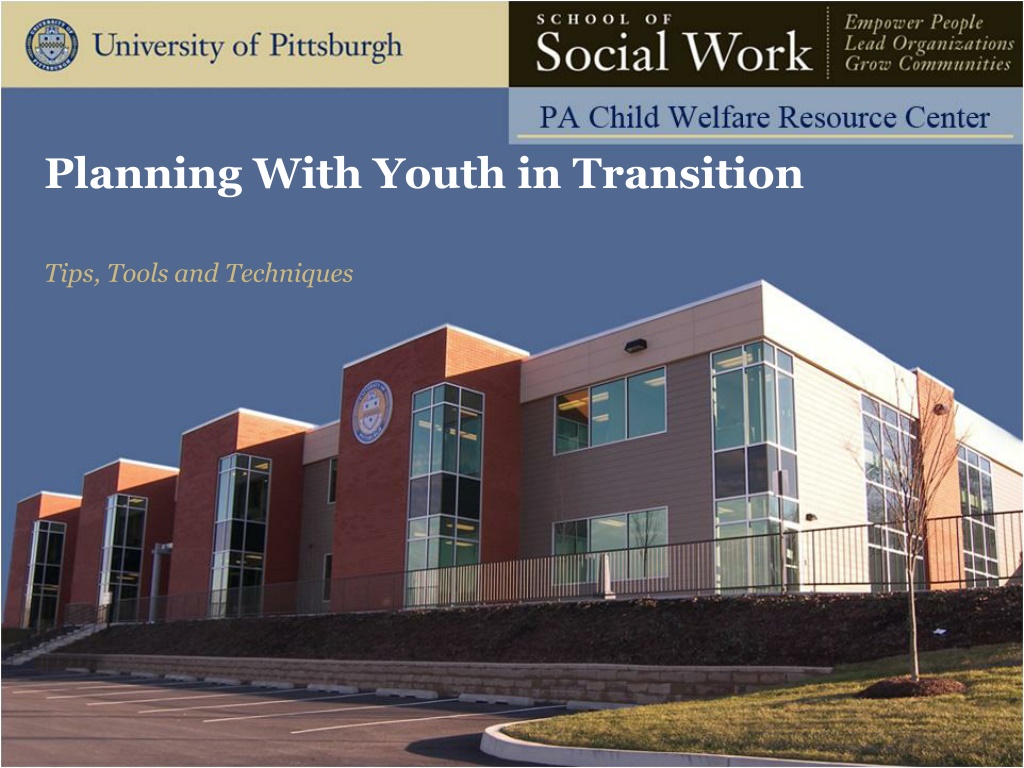
 undefined
undefined